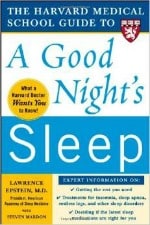Here’s how to know if over the counter sleeping pills will help you sleep, plus eight important facts about sleep medications. Not all sleep problems are helped by sleep medications – and the first thing you need to know is why you can’t fall or stay asleep.
Insomnia is a problem that over the counter sleep aids can help. However, if you have sleep-disordered breathing or a sleep disorder, sleeping pills won’t help you get a good night’s rest. In fact, pills may be harmful to your health if taken unnecessarily.
Sleeping pills – including over the counter sleep aids – are among the most widely used drugs in North America. About 10% of adults use over the counter sleeping pills, and 10% use prescription medications for sleep.
Insomnia versus sleep-disordered breathing
One thing you need to know before you take over the counter sleeping pills is why you can’t sleep. If you’re haven’t found a cause of your insomnia, sleeping pills may not work.
Dr Barry Krakow is a sleep doctor and the Medical Director of Maimonides Sleep Arts and Sciences in Albuquerque, New Mexico. He recently analyzed charts of thousands of current and former patients for a research study.
Dr Krakow found that patients who took sleeping pills:
- Still required more than 30 minutes to fall asleep
- Woke up during the night
- Were awake more than 15% of the time were in bed
Of 1,210 patients who saw Dr Krakow because of insomnia, 899 already had been taking over the counter sleeping pills and sleep medications. And, all 899 still couldn’t get good sleep.
Over the counter sleeping pills don’t help sleep-disordered breathing
He believes over the counter and prescribed sleeping pills didn’t work for those patients because they didn’t have insomnia. They had a sleep disorder. “The average person on these pills has been taking them for four, five, 10, 20 years,” he said. “For all we know, the sleeping pills have some benefits, but did they cure insomnia? No. It turns out you have another problem.”
According to Dr Krakow, the reason some people can’t sleep isn’t insomnia – and that’s why over the counter sleeping pills didn’t help them sleep better. Sleep-disordered breathing includes a variety of breathing abnormalities, such as obstructive sleep apnea (when you stop breathing during sleep), upper airway resistance syndrome, and snoring.
Undiagnosed sleep disorders are harmful to your health
Dr Krakow’s patients had been taking sedating agents, over the counter sleeping pills, and sleep medications for at least four years, on average. They suffered from insomnia for more than a decade. Between 80% and 90% had sleep-disordered breathing – and not being diagnosed properly affected their health and quality of life. The consequences of untreated sleep-disordered breathing includes high blood pressure, low energy, and mood symptoms, and in our view acts as an aggravating influence on their insomnia, which then seems to trigger more prescriptions for sleep aids.
But – over the counter sleeping pills can be very effective!
Like with anything, some sleeping pills work great for some people, and others don’t work so well.
Instant Sleep Complete Natural Sleep Aid received the highest customer reviews on Amazon as an over the counter sleeping pill. It contains L-Theanine, 5-HTP, Melatonin, Magnesium, Mucuna Pruriens Extract, GABA, and Phellodendron Root (herb powder), and doesn’t cause a “sleep hangover” – which is one of the unwelcome side effects of many sleep medicines.
However, before you take over the counter sleeping pills or prescription sleep medications, you should make sure you actually have insomnia and not sleep-disordered breathing. How? By talking to your doctor, and learning about sleep disorders.
8 Things You Need to Know About Sleeping Pills
In 10 Remedies for Jet Lag, I mentioned that I can’t take sleep aids because I feel groggy the entire next day. My husband, on the other hand, seems to have no problem with over the counter sleeping pills.
What separates one over the counter sleeping pill from another? Here are a few major differences between different types of sleep medications…
1. Effectiveness
 “Some sleeping pills take effect within ten minutes, while others take an hour or more,” writes Dr Lawrence Epstein in The Harvard Medical School Guide to a Good Night’s Sleep. “Some wear off quickly (in one to five hours), while others last much longer (six to eight hours or more).”
“Some sleeping pills take effect within ten minutes, while others take an hour or more,” writes Dr Lawrence Epstein in The Harvard Medical School Guide to a Good Night’s Sleep. “Some wear off quickly (in one to five hours), while others last much longer (six to eight hours or more).”
The “half-life” of an over the counter sleeping pill is how long it takes the drug to leave your body – and this can help you decide which sleep aid you should take. A fast-acting drug will help if you have trouble falling asleep; a longer lasting sleeping pill may be more helpful for people who can fall asleep but can’t stay asleep.
2. Impact on sleep quality
Over the counter sleeping pills can help you fall asleep fast, help you stay asleep, and extend the amount of time you sleep. But, sleep aids and medications also change “sleep architecture.” They increase the amount of time you spend in stages one and two of sleep, and decrease your REM (rapid eye movement) or deep sleep. In other words, you get less deep sleep when you take over the counter sleeping pills.
3. Tolerance
Some sleep medications become less effective over time, and you need to take more medicine to keep sleeping. This is developing a tolerance to over the counter sleeping pills.
4. Insomnia rebound
“Stopping sleep medication abruptly after long-term use can cause some people to experience insomnia even worse than the insomnia they had before they started the regime,” writes Dr Epstein in A Good Night’s Sleep. “This rebound insomnia, which usually only lasts a few days, may be accompanied by muscle tension, restlessness, irritability, or in rare cases convulsions.” To about rebound insomnia, slowly wean yourself off the over the counter sleeping pills.
If you’re starting to think twice about taking over the counter sleeping pills for insomnia, think about Yogi Bedtime Tea
. It contains valerian and organic chamomile help calm restlessness, and passionflower to reduce stress and help you fall asleep. The licorice, cardamom and cinnamon add delicious, warming flavor to this all natural herbal supplement for sleep.
5. Dependence
If you’re convinced you can’t get a good night’s sleep without sleep medicine or natural sleep aids, you might become trapped in a cycle of stopping and starting sleeping pills. This is a powerful psychological dependence, and the likelihood of dependence depends on the class of drug you’re taking.
6. Safety
The sedation caused by over the counter sleeping pills can reduce your reaction time and coordination, and judgment. This can affect your driving, operating machinery (including basic kitchen tools and appliances!), and decision making skills. When you take pills to help you sleep, make sure you allow the medication to wear off before setting out for the day.
7. Side effects of sleeping pills
This is what I experienced when I took an over the counter sleep aid: a hangover the next day that had nothing to do with drinking! A sleeping pill hangover is the result of the medication staying in your body after you’ve woken up. Other frequent side effects of over the counter sleeping pills include dizziness, dry mouth, and upset stomach.
It’s also possible that sleeping pills reduce the likelihood that you notice other sleeping disorders, such as grinding your teeth when you sleep.
8. Effects on other medications
Sleeping pills – even over the counter ones and natural sleep aids – can affect the effects of other medications. Talk to your doctor or pharmacist if you’re taking prescription drugs, and ask how the medications will interact. Sleeping pills can also affect allergy medicine, diet pills, and natural supplements.
What is your experience with using over the counter sleeping pills to help you fall asleep?
Now, I cope with insomnia and jet lag by reading. And praying – I find that connecting with God fills me with a sense of peace and serenity, which helps me sleep.
Sources: 1) Pharmacotherapeutic Failure in a Large Cohort of Patients With Insomnia Presenting to a Sleep Medicine Center and Laboratory by Barry Krawkow, on Mayo Clinic Proceedings; and 2) A Missing Link: Dr Barry Krakow’s Research on Insomnia and SDB on SleepReviewMag.com.




